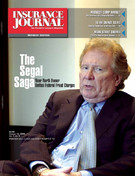When he was finally appointed Illinois’ new insurance director two months into a new governor’s term last March, J. Anthony Clark was put in an untenable position. He had been interviewing for a job in Democratic Gov. Rod Blagojevich’s administration since the previous December — first for a judgeship, then as insurance director — and then had to deal with the ultimate double whammy.
His boss, facing a $5 billion budget deficit, proposed cutting the staff and funding for the Department of Insurance and raising a series of taxes and fees on the insurance industry.
Welcome to office!
“We have been challenged to do more with less, and I think it’s a possibility,” Clark told Insurance Journal last April. “Every department wants to have more flexibility that funding does provide. There are some areas in some positions that I would like to see more funding or more leeway to do things. But when it comes to the governor’s cuts, we’re very much looking at it as a challenge … For the most part I think we’re going to live with what we have.”
As the Illinois General Assembly once again convenes and the governor foresees another multibillion-dollar deficit, the possibility of even further cuts, taxes and fees may make his job even tougher. Industry lobbyists are still seething about what they perceive as a raw deal in the budgeting process.
“We have had past administrations that have ‘raided’ the dedicated funding for [general revenue fund] money,” said Michael J. Tate, chief operating officer of the Professional Independent Insurance Agents of Illinois. “The translation of that is it becomes a business tax on the insurance industry. When you take that funding and strip that funding out, now what you’ve really done is take the fines, fees and taxes on insurance that go into the general revenue fund wind up being a special tax on insurance industry. We’re concerned about that practice continuing. Hopefully it was just a fiscal bump in the road and this was a one-time incident.”
Yeah, I’m the taxman
Last year’s budget included a 3.5 percent tax (up from 3 percent) on gross surplus line premiums whose retroactivity to Jan. 1, 2003, sparked an ultimately unsuccessful backlash from surplus line brokers. The budget also doubled the cost of motor-vehicle reports purchased from the Secretary of State, from $6 to $12 each. Meanwhile, the state’s financial regulatory fees — paid by insurance companies to fund department auditing — were increased by 50 percent, while the affiliated group maximum went from $100,000 to $250,000. Workers’ compensation premiums also were dealt a new surcharge of 1.5 percent, and self-insureds now have to pay 0.045 percent payroll tax. Producer licensing fees went up $30 for Illinois residents and $100 for non-residents.
Tate praised Clark’s accessibility and attentiveness to legislative issues, including a successful effort to restrict the use of credit-based insurance scoring according to a model promoted by the National Conference of Insurance Legislators. But Tate also made clear the industry’s frustration.
“I would hope that he would fight for his department,” Tate said. “Hopefully Blagojevich only does this once. My worry is that he’s got a $4 billion problem next year and he does it again.
“I don’t want to be an advocate of big government,” Tate added, “but I do want to ensure that consumers are protected in this state. I don’t want agents running around ripping off people, and I don’t want companies running around ripping off people. There are minimum levels of staffing that need to be maintained. If you come back and raise my filings, fees and taxes, you’d better pay for the minimum to do your regulatory responsibility.” Clark did not return a call by deadline seeking comment.
‘Bad dose of free-market economics’
Clark came to the job with an insurance background. From 1986 to 1997, he worked for Montgomery Ward Life Insurance. When the company was purchased by GE Financial in 1997, Clark decided to open his own private law practice in Chicago. Crediting his career background and education, Clark described his regulatory philosophy as business-friendly.
“I came out of the University of Chicago,” he said. “I got a bad dose of free-market economics and their viewpoint of the world. It is the view of the department to encourage free-market competition. I’m glad that it does allow companies to operate with a relative lack of restrictions. Illinois is a good place for companies to come and domesticate.” The insurance industry is the second-leading employer in the state, a ranking which PIIAI’s Tate fears may slip.
“Don’t tax us out of business,” he said. “It’s happened in other states, and we don’t want companies running to the border to find a better deal in Iowa and Indiana.”
To comment on this story, e-mail: koreilly@insurancejournal.com.
Was this article valuable?
Here are more articles you may enjoy.


 World’s Growing Civil Unrest Has an Insurance Sting
World’s Growing Civil Unrest Has an Insurance Sting  Preparing for an AI Native Future
Preparing for an AI Native Future  Insurify Starts App With ChatGPT to Allow Consumers to Shop for Insurance
Insurify Starts App With ChatGPT to Allow Consumers to Shop for Insurance  AIG’s Zaffino: Outcomes From AI Use Went From ‘Aspirational’ to ‘Beyond Expectations’
AIG’s Zaffino: Outcomes From AI Use Went From ‘Aspirational’ to ‘Beyond Expectations’ 


